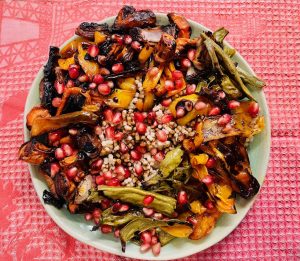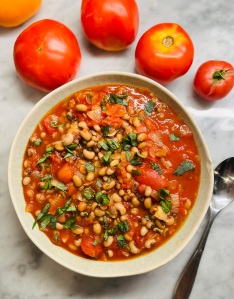 I love Sukkot–eating outside, enjoying fall fruits and vegetables, deepening our connections with nature and agricultural cycles. I recently spent time at an incredible native plants nursery near my home. It was fantastic: endless rows of plants native to the Mid-Atlantic region with detailed signs explaining the type of soil and sun they prefer. Between the rows the ground was deep mud and water after heavy rains for two days. Trudging along the rows in my rain boots, I just wanted to buy everything! The native plants are essential because they are “native” to the region in which they evolved and planting them helps to support biodiversity that attracts pollinators such as bees as well as butterflies and birds, better absorbs groundwater retention, and doesn’t require the use of chemicals. Perhaps native plants don’t look as neat and trim as other gardens but they are humming, buzzing and flourishing. The Sukkot dish I made reinforces the importance of local, sustainable agriculture and happens to be easy and delicious. Continue reading
I love Sukkot–eating outside, enjoying fall fruits and vegetables, deepening our connections with nature and agricultural cycles. I recently spent time at an incredible native plants nursery near my home. It was fantastic: endless rows of plants native to the Mid-Atlantic region with detailed signs explaining the type of soil and sun they prefer. Between the rows the ground was deep mud and water after heavy rains for two days. Trudging along the rows in my rain boots, I just wanted to buy everything! The native plants are essential because they are “native” to the region in which they evolved and planting them helps to support biodiversity that attracts pollinators such as bees as well as butterflies and birds, better absorbs groundwater retention, and doesn’t require the use of chemicals. Perhaps native plants don’t look as neat and trim as other gardens but they are humming, buzzing and flourishing. The Sukkot dish I made reinforces the importance of local, sustainable agriculture and happens to be easy and delicious. Continue reading
Sukkot Couscous & Fall Vegetables
2

